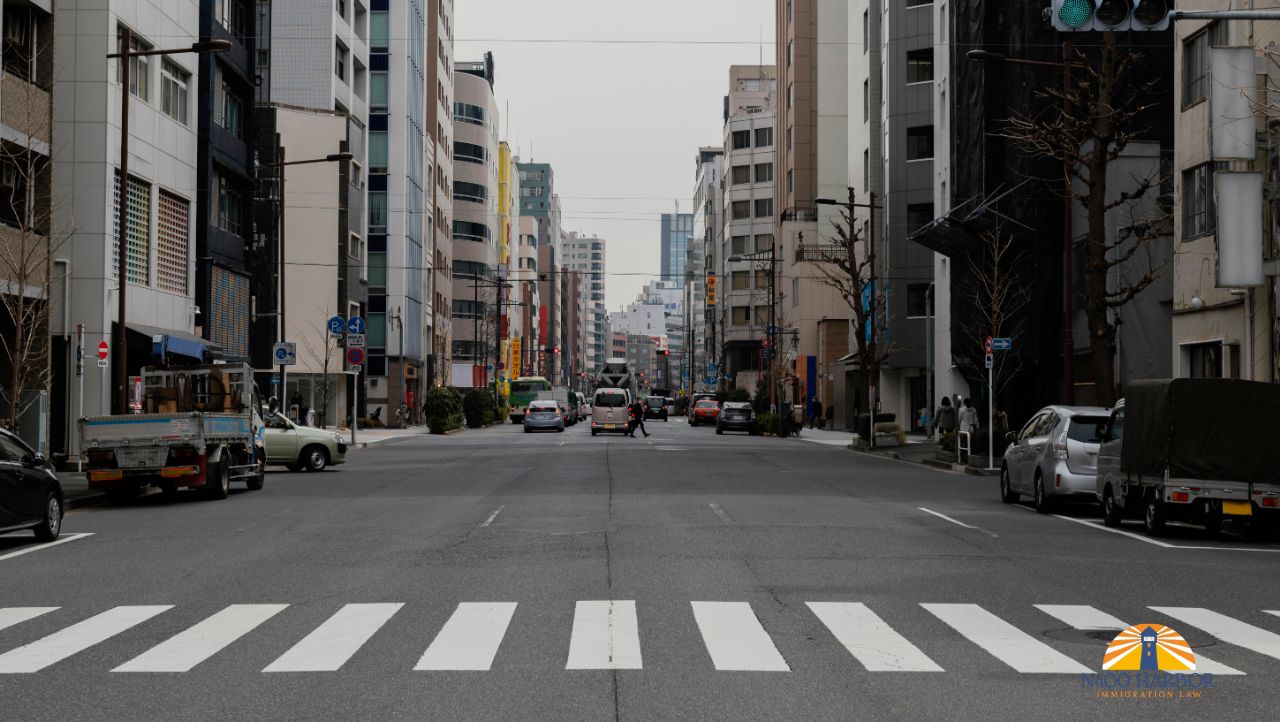
IN THIS ARTICLE
Key Takeaway
This incident underscores a broader issue beyond immigration policy alone—it highlights the need for more effective cooperation and alignment between state criminal justice systems and federal immigration authorities.
On January 27, 2024, two NYPD officers were assaulted near a migrant shelter in Times Square, New York, casting a spotlight on the intricate interplay between immigration laws and public safety. This incident underscores the critical need for a nuanced discussion on the current state of immigration and Customs Enforcement, Department of Homeland Security initiatives, and the broader implications for deportation policies.
The event not only raises important questions about the enforcement of immigration laws but also invites a broader examination of how such laws are intertwined with national security and community relations. As we delve into this analysis, we will explore the legal and immigration implications, ensuring an objective stance that disentangles the complexities surrounding immigration laws in the United States.
“On the evening of January 27, 2024, a confrontation unfolded in Times Square, New York, resulting in the assault of two NYPD officers near a migrant shelter.”
Background of the Incident
On the evening of January 27, 2024, a confrontation unfolded in Times Square, New York, resulting in the assault of two NYPD officers near a migrant shelter. This incident has drawn significant attention due to the implications it holds for immigration laws and public safety. Here is a detailed breakdown of the event:
Timeline and Arrests
- 8:30 PM: Assault occurs, leading to minor injuries for two officers.
- Arrests: Seven (7) individuals indicted; initial arrests include Yorman Reveron, Darwin Andres Gomez Izquiel, Kelvin Servat Arocha, and Wilson Juarez on the day of the attack. Subsequent arrests of Jhoan Boada, Yohenry Brito, and Jandry Barros follow [1].
Incident Details
- Start of Altercation: Officers approached a group blocking a sidewalk outside a shelter. Yohenry Brito resisted compliance, initiating the conflict.
- Sequence of Events: Body-camera footage suggests Brito was pushed by an officer before others in the group joined the attack [1].
Aftermath and Legal Proceedings
- Charges: Indictments include assault on a police officer, gang assault, and other related charges. While six suspects have been charged, most were released without bail, sparking criticism [1][5].
- Investigation: Ongoing efforts by Manhattan DA Alvin Bragg to collect evidence for grand jury presentation. Some suspects are believed to have fled to California [4][6].
This incident has intensified discussions around immigration laws and their enforcement, highlighting the complex relationship between public safety and immigration policy.
Legal Implications & Immigration Laws
The Jan 27 NYPD attack has brought to light several critical issues regarding the enforcement and implications of immigration laws in the United States, particularly within the context of sanctuary city policies and cooperation between local law enforcement and federal immigration authorities.
Legal Framework and Sanctuary Policies
- New York’s sanctuary city status limits cooperation between local law enforcement and federal immigration authorities, impacting the deportation process for migrants involved in criminal activities [3][8].
- Despite the charges, current laws and policies make it challenging to deport individuals solely based on criminal charges, requiring a conviction for deportation in cases involving non-legal residents [1][8].
Investigation and Prosecution Challenges
- The Manhattan District Attorney’s office faces public pressure for swift action, highlighting the need for a thorough investigation to ensure the right suspects are held accountable [2].
- The release of suspects without bail and the subsequent difficulties in tracking their whereabouts underscore the complexities of legal proceedings in such cases [1][4][6].
Implications for Immigration Enforcement
- The incident underscores the strained relationship between local policies and federal immigration enforcement, with ICE now relying more on public or media reports for information on individuals involved in criminal activities [8].
- Advocates argue for the release of body camera footage to ensure transparency and accountability in the handling of the incident [4].
This situation illustrates the delicate balance between ensuring public safety, upholding the rights of migrants, and navigating the legal intricacies of immigration laws and local policies.
Political Reactions and Public Opinion
In the aftermath of the Jan 27 NYPD attack, the political and public response has been multifaceted, revealing a complex web of opinions and calls for action:
Political Reactions
- Calls for Policy Reevaluation: The incident has reignited discussions on New York City’s sanctuary city laws, with Republican lawmakers and Mayor Eric Adams advocating for a reconsideration of these policies [2].
- National Attention: Two NYPD officers involved in the incident were invited by New York Republican lawmakers to President Joe Biden’s State of the Union address, highlighting the national significance of the debate on immigration laws [9].
- Judicial and Legislative Criticism: Republicans have voiced strong criticism towards Democratic Manhattan District Attorney Alvin Bragg for his decision not to seek bail for some of the individuals arrested in connection with the attack [8].
Public Opinion and Advocacy
- PBA and Official Stance: The Police Benevolent Association, along with figures like Councilman Justin Brannan, has expressed outrage, emphasizing the need for accountability and consequences for attacks on police officers [1].
- Governor’s Intervention: Governor Kathy Hochul has publicly condemned the violence against officers, advocating for judicial and prosecutorial diligence and hinting at the potential for deportation in cases involving non-legal residents [1].
Critiques of Political Rhetoric
- Accusations of Fear Mongering: Alexa Avilés criticized city officials for engaging in what she perceives as fear mongering, echoing concerns about the scapegoating of immigrants and the politicization of immigration laws for electoral gain [7].

Our take on this issue
The current state of U.S. immigration policies remains a contentious topic, reflecting a broad spectrum of opinions and interpretations. At the heart of the debate is the strictness of existing immigration laws, particularly concerning individuals with a criminal history. These laws are designed with the intent to protect public safety by ensuring that those who pose a danger, due to violent or criminal behaviors, do not gain immigration benefits that would allow them to remain in the country. This principle is broadly supported; however, its application and the broader immigration system’s interaction with state criminal justice systems can lead to complex and sometimes contentious situations.
A recent incident in New York has brought these issues into sharp focus. Several asylum seekers, after being involved in the assault of police officers, were released from state custody. This incident has ignited debate, not because of the federal immigration laws per se, which clearly do not allow individuals with such serious offenses to obtain immigration benefits, but rather due to the decisions made within New York’s criminal justice system. The fact that these individuals were not transferred to Immigration and Customs Enforcement (ICE) custody for potential immigration enforcement actions, but instead were released, points to a disconnect or a failure in coordination between state-level criminal justice systems and federal immigration enforcement protocols.
Critically, this incident underscores a broader issue beyond immigration policy alone—it highlights the need for more effective cooperation and alignment between state criminal justice systems and federal immigration authorities. The principles of securing public safety and ensuring justice are paramount and require that entities at all levels of government work together seamlessly. When individuals known to have committed serious crimes are released without appropriate consideration of their immigration status and potential federal interest, it signals a gap in this cooperation, potentially undermining both public safety and the integrity of the immigration system.
Comprehensive immigration reform is often cited as a solution to these and other issues plaguing the current system. Such reform should strive to balance the United States’ security needs with its foundational principles of freedom and justice. This means not only tightening the avenues through which violent or criminal individuals can exploit the system but also creating clear, humane pathways for those genuinely seeking asylum or a better life through legal channels. Reform should also address the procedural and communication gaps between different levels of government, ensuring that immigration policies are enforced consistently and effectively, without compromising the rights and due process owed to all individuals.
Looking into the future
The January 27, 2024, attack on NYPD officers near a migrant shelter in Times Square brings to the forefront the complex interplay between America’s immigration laws and public safety concerns. This event, set against the backdrop of New York’s sanctuary city status and the intersecting issues of immigration enforcement and legal proceedings, highlights the intricate challenges at the crossroads of national security, community relations, and legal frameworks governing immigration and deportation.
The repercussions of this incident, coupled with the public and political reactions it has elicited, underscore the need for comprehensive policy evaluation and reform, grounded in a clear understanding and objective examination of current immigration laws and their impacts on both local and national levels.
As the conversation around immigration laws and their enforcement continues to evolve, it remains imperative to navigate these discussions with a focus on facts, aiming to bridge divides and foster a more informed, nuanced dialogue on the subject. Acknowledging the politicization of immigration issues in recent times, the path forward demands careful consideration of the legal intricacies, community safety, and the rights of all individuals involved.
After all, tThe United States has long been seen as a land of opportunity, a place where individuals from all backgrounds can seek a new beginning. Upholding this image requires a nuanced approach to immigration policy—one that recognizes the need for security and the rule of law, as well as compassion and justice. The incident in New York serves as a reminder of the complexities involved in achieving these goals, but it also reinforces the importance of striving for a system that reflects America’s highest values.
For those seeking guidance or facing challenges related to immigration laws and outcomes of such incidents, scheduling a free case evaluation can be a crucial step towards understanding and navigating the complexities of the legal landscape. This approach ensures that the discourse on immigration remains anchored in objective analysis, with an eye towards justice, equity, and the overarching values that define our nation.
Reference Material
[1] – https://www.cbsnews.com/newyork/news/nypd-officers-attacked-times-square-arrests/
[2] – https://www.thecity.nyc/2024/02/08/times-square-migrants-arrests-body-camera-footage-contradicts-nypd-account/
[3] – https://nypost.com/2024/02/04/metro/lefty-laws-protect-nyc-migrants-who-beat-cops-from-getting-deported-federal-pol-says/
[4] – https://www.cbsnews.com/newyork/news/coalition-of-clergy-bodega-owners-exasperated-over-response-to-nypd-officers-beaten-in-times-square/
[5] – https://www.cbsnews.com/newyork/news/pressure-mounts-on-da-alvin-bragg-after-assault-on-nypd-officers-in-times-square/
[6] – https://www.ny1.com/nyc/all-boroughs/politics/2024/02/04/da-says-charges-to-be-presented-to-grand-jury-in-police-assault-case
[7] – https://apnews.com/article/times-square-migrant-brawl-police-new-york-3504c2e1f4b6de73512c5a89b4cf2d48
[8] – https://www.politico.com/news/2024/02/05/republicans-new-york-sanctuary-city-laws-nypd-00139754
[9] – https://pix11.com/news/local-news/nypd-officers-attacked-in-times-square-to-attend-state-of-the-union/
[10] – https://www.foxnews.com/us/migrant-indicted-attack-nypd-officers-times-square

